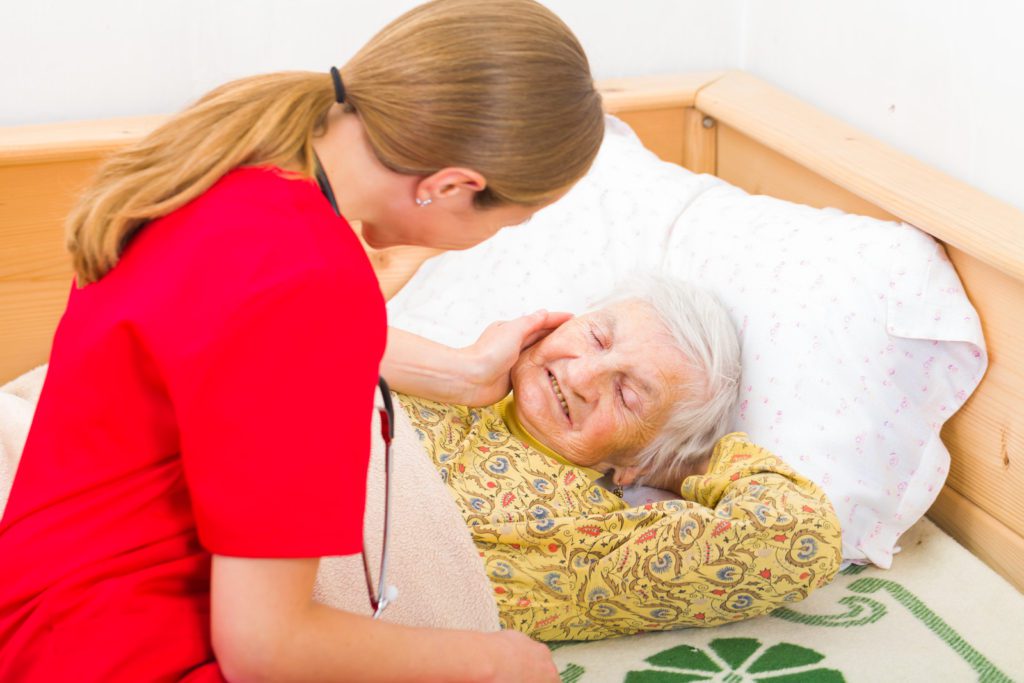
Getting enough sleep at night is absolutely critical for both physical and mental health. Yet, many people struggle in this area.
This may well be something you find as a caregiver, especially if you are concerned about your family or feel overwhelmed with stress. However, there is no shortage of information about how you can improve sleep quality and length.
For example, the Mayo Clinic offers an article on 6 Steps to Better Sleep and there is a comprehensive guide called Sleeping Well at the site Help Guide.
But, what about the person you’re caring for? Sleep will often become more difficult as people age, especially as many seniors have multiple chronic conditions and/or are on various medications. At the same time, some of the advice and guidance about promoting sleep may not be practical for seniors.
As a result, this article looks at how caregivers can help seniors sleep.
Working on this area is critical for your own health, just as much as the seniors. If the person that you’re caring for is able to rest well, it can often make life less challenging and stressful for you. If nothing else, improving the sleep quality of a senior could increase your chances of getting a full night’s sleep.
What is Normal?
Sleep problems are a common issue for seniors but they are often ignored or not taken seriously. Instead, many people assume that the need for sleep decreases as a person gets older, even though the research does not support that idea.
Nevertheless, while the need for sleep remains consistent as people age, sleeping patterns do change. In particular, seniors tend to:
- Take longer to fall asleep
- Be more tired when they wake up
- Spend less time in REM sleep
- Spend more time in lighter sleep stages and less in deep sleep
- Wake up during the night more often (resulting in fragmented sleep)
Additionally, the timing of sleep often shifts with age. This is known as Advanced Sleep Phase Syndrome and means that seniors tend to go to be relatively early and also wake up early.
Research isn’t exactly clear why this shift in timing occurs, although it could be associated with light and circadian rhythms – or possibly the fact that most seniors aren’t working.
So then, all of these patterns are fairly normal for aging, meaning that seniors won’t be getting the same quality of sleep than they did when they were younger. Nevertheless, insomnia is a major problem for seniors and isn’t something that should be overlooked.
One key indication that caregivers should consider is whether sleep issues are impacting the senior’s ability to function well. For example, if they are frequently tired and irritable, or if they seem to have difficulty concentrating, it may be time to look for solutions.
Ways Caregivers Can Promote Sleep in Seniors
The first step of promoting sleep for seniors is roughly the same as for any other age group. This includes a range of healthy strategies and patterns, including the following:
- Try to sleep and wake up at the same time each day
- Avoid sleeping in – regardless of the day
- Be careful with napping. While it can help people get extra sleep in, this can also make it more difficult to sleep at night
- Avoid bright light near bedtime (including television and backlit devices)
- Ensure the room is dark for sleep (as much as possible)
- Don’t consume caffeine in the evening
- Ensure that the bed is comfortable and has a good mattress for seniors
- Make the bedroom quiet. If that’s not possible, white noise can help with sleep
- Get enough exercise
- Avoid large meals too close to bedtime
All of these techniques can be effective, but they won’t always be enough. Many seniors find that they struggle with sleep, even though they experienced no such issues earlier in life. The pattern is often an indication of an underlying problem.
As such, there are also other approaches that you can take, which may prove to be more effective or achievable.
1. Check Their Medication
Many medications will affect a person’s ability to sleep, either directly or indirectly. The AARP lists ten different types of medications that can have this impact, along with how they do so.
Now, in many cases, a senior will need to be on medication for their health, especially if they have one or more medical conditions. However, there is often flexibility as well.
This means that you can (and should) talk to the senior’s doctor about issues with insomnia and see what solutions they offer. In many cases, the doctor may be able to change the dose of medication or try an alternative option.
2. Talk to the Doctor
It’s easy to assume that poor sleep is just a side effect of age, or even that seniors need less sleep overall. Yet, sleep problems may also indicate an underlying condition, such as sleep apnea.
Talking to the doctor can help determine whether there are any issues to be concerned about. The doctor may also be able to give suggestions about what can help.
In some cases, a doctor will prescribe medication to help with sleeping. This is particularly common if insomnia is a side effect of one of the senior’s current medications.
Medication for sleep does have its benefits and it can be necessary in some cases. Nevertheless, it’s normally best to try natural methods first.
3. Use Dim Lighting
Sleep advice typically suggests having the bedroom as dark as possible, to promote sleep. This is the ideal but it isn’t always feasible for seniors.
Instead, you may need to use dim lighting in the bedroom and in the hallway. This helps to reduce the risk of falls if seniors need to get up to use the bathroom. For that matter, having a dim light in the bathroom is also beneficial.
Using dim lighting like this can make it easier for seniors to get back to sleep. In contrast, bright lights typically wake people up and can exacerbate sleep issues.
4. Limit the Bed to Sleep
Another piece of common advice for sleeping is to limit the bedroom to sleep (and sex) only. Doing so helps to create a relaxing association, making it easier to go to sleep.
While that is the ideal, it may not be viable in all situations. For one thing, a senior’s bedroom can be their only safe space, especially if they are living in a crowded house. Likewise, anyone in a small apartment may need to use the bedroom for more than just sleep.
With that in mind, setting aside the bed for sleeping only can be a good compromise. This is a much easier goal to achieve and still helps create that positive association.
A key step to achieving this is to ensure there are other comfortable places to sit, such as armchairs.
For example, we found that the best solution for my mother-in-law was to have an old comfy computer chair in the room that she could watch TV from. This meant she would always use the chair rather than the bed, which was good for posture as well.
5. Nap Early – Or Avoid Naps
Napping can be necessary for some people, especially if they get broken sleep at night. But, it is a mixed blessing, as any sleep during the day can affect later ability to sleep.
With that in mind, it’s best for seniors to nap earlier in the day rather than later. Likewise, short naps are the most effective.
A good general rule is not to nap in the late afternoon or early evening.
What about you? Have you found any other tips or strategies that help seniors to sleep better?


Leave a Reply